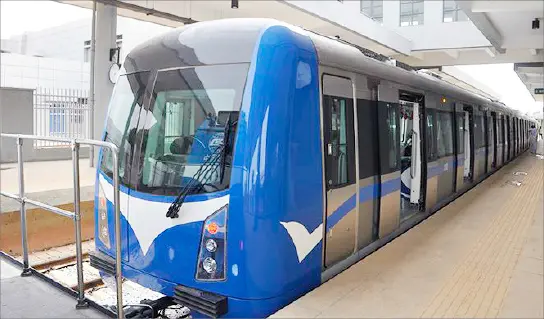Sometime this week, it appears, the infamous Abuja light rail will thunder into life. Again. Perhaps for a year or two.
According to Nyesom Wike, the Federal Capital Territory (FCT) Minister, the new tape-cutting will be undertaken by President Bola Tinubu in celebration of his first anniversary in office. To that extent, I am in full approval, as his government needs to show something for its presence.
It is ironic that for this, the APC government owes its gratitude to Mr. Wike, a PDP mainstreamer, but these are desperate times.
APC ought simply to have announced that the train services were being restored and left it at that. In July 2018, the service was loudly inaugurated by the fake anti-corruption leader from Daura, who then sat back in the same city and watched it go out of service and into decay.
When the service resumes, for the few in Abuja who can take advantage of it, the ruling party will have plenty to be grateful to the opposing PDP for, including what Minister Wike described as the building of access roads to the train stops.
It would be remembered that last October, the government approved N5.9 billion for the construction of those roads, which was apparently quickly undertaken, although it is unclear where they are, how the contractors obtained and completed the jobs so quickly, or what standards they met.
Wike also identified design omissions he had inherited in the rail system, such as escalators and elevators, and waiting room air-conditioning, but observed that they will not hinder the resumption of services.
The Minister also announced large savings in training costs, telling journalists last week: “Before we came, the former administration approved $128 million for the training of our people by CCECC for 29 months, and we said no, that’s very exorbitant. We renegotiated with CCECC, and now it has been brought down to $75 million. We have saved no less than $53 million for the government.”
These issues are critical to understanding the hollowness of governance in Nigeria, not simply our infrastructure chaos. In a previous article, I drew attention to the reckless spending in the rail sector during the Buhari years, including the Abuja light rail.
As part of that story, I provided evidence that in addition to the $823m spent on the abandoned Phase I, the Buhari government in May 2017 also signed a contract worth US$1.473 billion with the Board of Directors of China Railway Construction Corporation (CRCC), the parent company of CCECC, for Phase II.
Indeed, two months earlier, the then-FCT Minister, Mohammed Bello, had announced that the China Exim Bank would bankroll Phase II for $1.79bn.
Phase II was also to be completed in 54 months: that is, in 2021, two years before Buhari was due to be separated from the presidency.
Characteristically, he neither delivered nor ever mentioned it again. As one who has kept a close eye on the rail file, I believe this to be deliberate. The Buhari government had neither the intention nor the capacity to advance the sector beyond politics.
That is why projects and contracts got bandied around so much, particularly by Transportation Minister Rotimi Amaechi, a man who advertised how much he did not like money.
Maybe he did not. The alternative is that he was incompetent and complicit. Of his tenure, in 2019 I penned Infrastructure Games I and II, which partly explored his, and his government’s, inconsistencies.
In the closing years of the Buhari presidency, they also spawned such headlines as: “Lack of funds halts Eastern railway project —FG,” (The Punch, December 2022); “Lack Of Funds Stalls N16tr Railway Projects Across Nigeria,” (Daily Trust, September 2023); and “Poor Funding Model, Paucity, Stall $3.2bn Eastern Rail Project Three Years After,” (The Guardian, April 2024).
But none of this was true: it was the government, not an absence of funding or of prospective funders, that had grounded infrastructure development. Governments, government officials, their families and cronies did not lack funds to live in luxury, including through the fleecing of their offices, it was when it came to service or telling the truth that there was a problem.
And there was a problem with funding infrastructure, particularly rail, as loan negotiations with China had ground to a halt in the early months of Buhari’s arrival. According to the story, the Chinese government, reportedly concerned about the fast-fingers of Nigerian officials, was insisting that for Nigeria to obtain any more loans, it must concede their supervision to Chinese officials.
That story was broken by The Guardian in August 2016, and it meant that for the entirety of the Buhari Years, the speeches its officials made about loan arrangements and expectations with China were patently false. It was why the government was floundering all over, and back to Beijing.
Some areas of the rail file got so messy that on many occasions, beginning as early as November 2016, National Assembly committees commenced investigation of Mr. Amaechi, but none of them yielded anything. Frustrated newspaper editors agonized about both trade and politics.
How did the Buhari government respond? It maintained a straight face, told more robust lies, and issued more contracts as time ran out, including, in February 2022, a $329 million in consultancy fees “for the supervision of the various railway projects in the country.” Three hundred and twenty-nine million, not for a rail project, but for “consultancy supervision.”
That was the scenario in which Buhari’s Abuja light rail of 2018 collapsed in 2020 and the country was strewn with a litany of broken infrastructure promises as he departed. When Mr. Tinubu congratulates himself on the re-completion and re-inauguration of Phase I of the Abuja rail then, he must remember to unveil Phase II. It is inconceivable that a project that was supposed to have been completed three years ago is hiding in the open.
What does the future hold? If it is to endure, the government must set up appropriate structures and hand the project over to experts who know what it is to run a light rail facility. The good folks at the Nigeria Railway Corporation (NRC) are already out of their depth using bottles to supply diesel to trains in dangerous forests and leaves to try to stop engine fires.
In a riveting story last year, rail expert Rowland Ataguba, a member of the NRC, offered a penetrating analysis of ‘The Trouble With ‘Abuja Light Rail.’ If we are not to be back here within a couple of years trying to restart Phase I of this novel rail system, the government must put it in the hands of such people and step back.
Already, we have become the laughing-stock of the travel world, Bloomberg last year calling the Abuja light rail a ‘ghost train’ and the ‘latest example of empty promises in Nigeria.’ The two rail-track “security contracts” the Buhari government issued in 2022 for $1.7m expire three months from now, and that government never obeyed a court order to account for its predecessors’ CCTV scams between 2004 and 2013.
In other words, apart from when Tinubu and Wike ride the rail, the system will be defenceless from Day One.


 Join Daily Trust WhatsApp Community For Quick Access To News and Happenings Around You.
Join Daily Trust WhatsApp Community For Quick Access To News and Happenings Around You.


